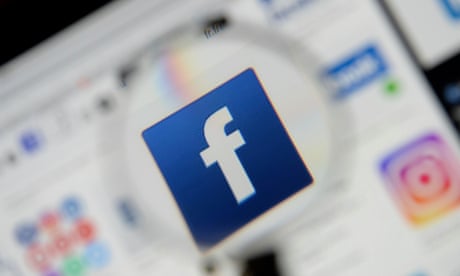Claims Biden immigration policies risked more Covid-19 as company also blocks ads delegitimizing election results
Kari Paul Thu 1 Oct 2020

Facebook has rejected ads from the Trump campaign.
Photograph: Dado Ruvić/Reuters
Facebook has removed a number of ads from the Trump campaign for making misleading and inaccurate claims about Covid-19 and immigration.
On Wednesday the social media platform took down the Trump-sponsored advertisements which claimed, without evidence, that accepting refugees would increase Americans’ risk of Covid-19. The ad, which featured a video of Joe Biden talking about the border and asylum seekers, claimed, also without evidence, that the Democratic candidate’s policies would increase the number of refugees from Syria, Somalia and Yemen by “700%”. More than 38 versions of the ad were run on Facebook and were seen by hundreds of thousands of people before the company removed them.
Facebook did not immediately respond to a request for comment, but said in a statement to NBC news the ads violated its policies. A version of the advertisement can still be seen in Facebook’s library but is now inactive, meaning it is not being run across any Facebook products.
Facebook has removed a number of ads from the Trump campaign for making misleading and inaccurate claims about Covid-19 and immigration.
On Wednesday the social media platform took down the Trump-sponsored advertisements which claimed, without evidence, that accepting refugees would increase Americans’ risk of Covid-19. The ad, which featured a video of Joe Biden talking about the border and asylum seekers, claimed, also without evidence, that the Democratic candidate’s policies would increase the number of refugees from Syria, Somalia and Yemen by “700%”. More than 38 versions of the ad were run on Facebook and were seen by hundreds of thousands of people before the company removed them.
Facebook did not immediately respond to a request for comment, but said in a statement to NBC news the ads violated its policies. A version of the advertisement can still be seen in Facebook’s library but is now inactive, meaning it is not being run across any Facebook products.

Facebook's long-awaited oversight board to launch before US election
“We rejected these ads because we don’t allow claims that people’s physical safety, health, or survival is threatened by people on the basis of their national origin or immigration status,” a Facebook spokesman, Andy Stone, told NBC News in a statement.
The removal is the latest action taken against the Trump administration as social media platforms attempt to rein in misinformation ahead of the 2020 elections. It follows other removals of Trump ads including one in June, which featured a Nazi symbol. The company removed another Trump ad in 2018 saying it violated its rules against “sensational content”.
Following the removal of the ad on Wednesday, Courtney Parella of the Trump campaign doubled down on the advertisement’s claims in a statement. She did not cite the source of the 700% figure featured in the ad.Facebook is also changing its policies to prevent ads that delegitimize election results, project manager Rob Leathern tweeted on Wednesday. Under the new policies, ads cannot prematurely declare victory, present any method of voting as fraudulent or corrupt, or make accusations of voter fraud. The changes to these policies apply to both Instagram and Facebook and apply immediately as of Wednesday, he said.
“While President Trump took decisive action to restrict travel from China to slow the spread of coronavirus and saved countless lives, Joe Biden was busy calling the president xenophobic and armchair quarterbacking his pandemic response,” she said.
The Biden campaign did not immediately respond to a request for comment.
Although Facebook removed the ads regarding refugees and Covid-19, other misleading advertisements remain on the platform. One ad shows Joe Biden with a headphone photoshopped to his ear, perpetuating the false claim that the presidential candidate somehow cheated in the debates.
The advertisement appears to have been launched on the day of the debate but remains active on the platform, with more than 800 versions still active. The ads have been viewed by more than 3.6 million people, the majority of whom are in the key election states of Florida and Pennsylvania, according to Facebook data.
The Trump campaign’s ads have led to the “earpiece” conspiracy theory spreading organically on other social media platforms, including TikTok, according to the watchdog group Media Matters. The group has found four examples of TikTok videos espousing the theory that have been viewed more than 560,000 times. A spokesperson for TikTok said the videos violate its policies on disinformation and it is working to remove them as they are posted.
“You would not have seen the proliferation of conspiracy theories on TikTok today if there was not already an intense saturation of this idea from the Trump campaign yesterday,” said Angelo Carusone, president of Media Matters. “They sort of seeded the ground with this idea until the users themselves were driving it.”
No comments:
Post a Comment